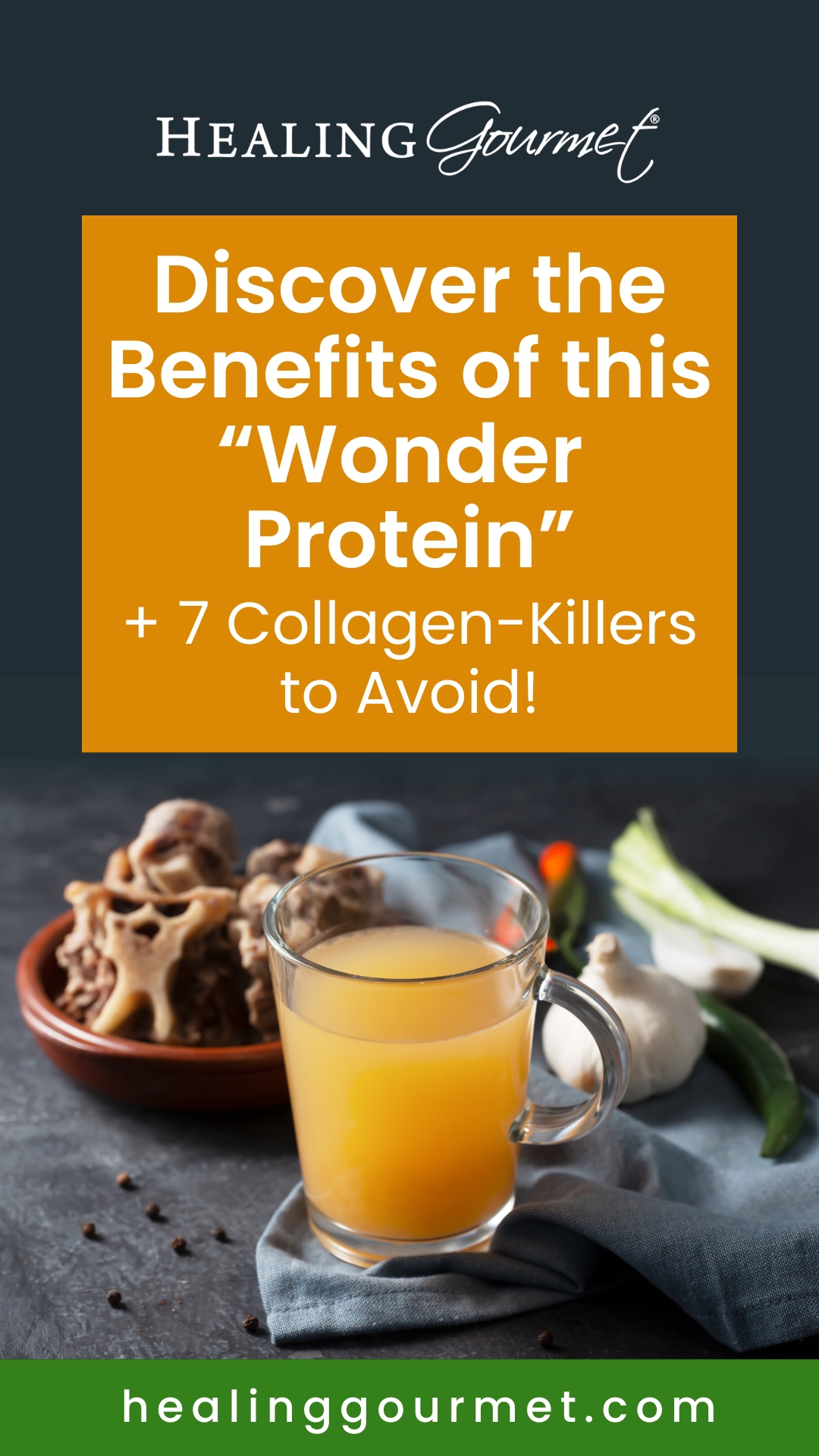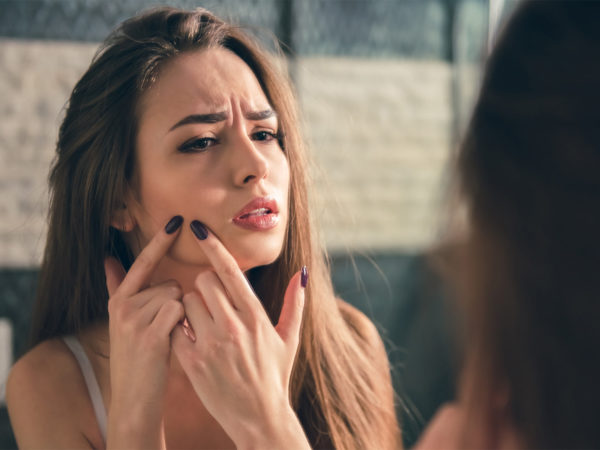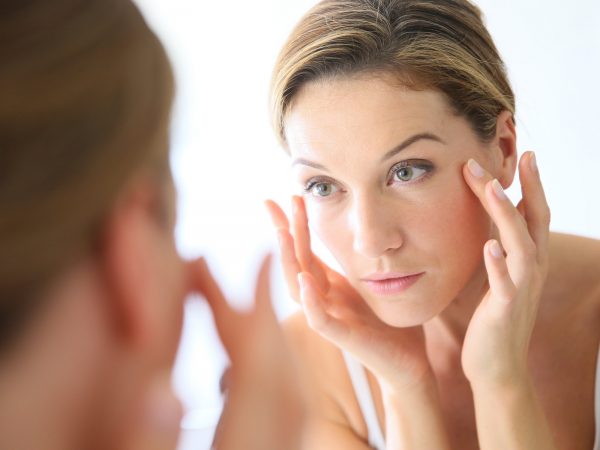The Wonder Protein for Looks and Longevity
Are wrinkles, fine lines, and saggy skin getting you down?
Look no further than the fountain of youth, packaged in a Mason jar…
Collagen!
The secret weapon of celebrities and beauty experts alike, collagen has now caught the attention of health professionals and doctors, who recommend it for its numerous anti-aging and health-promoting benefits.
From plumping up your skin and reducing fine lines and wrinkles, to strengthening your hair and nails, and improving joint and cardiovascular health, collagen is the ultimate multi-tasking food and supplement.
In this series, we’ll explore the science behind why celebrities and health experts alike are turning to collagen for their beauty and anti-aging needs and how you can protect your collagen as you age. Plus: The foods, nutrients and cooking methods that will maximize this unique protein in your diet and your body.
But first, let’s explore what collagen is and why you want to protect your body’s own supply as you age!
Collagen: The “Wonder Protein” Vital for Your Looks & Longevity
Collagen is the main component of connective tissues. It is found in your skin, bones, and even blood vessels. It is a superhero protein for keeping your hair, skin and nails, tendons, ligaments, and cartilage in tip-top shape.
Collagen provides strength and support to these tissues. It helps to protect and cushion organs and other structures. It gives hair and skin the “bouncy” properties we associate with youth.
It is also helpful for maintaining that youthful glow in your skin, keeping it hydrated, elastic and wrinkle-free. And it’s essential in wound healing and forming new blood vessels.
Obviously, collagen is not just for “aesthetic” purposes. But as you age, your body produces less of this “Wonder Protein”, which does lead to fine lines and wrinkles.
How Collagen Breaks Down as We Age
As you age, there are also changes in the structure and number of skin cells. The rate of skin cell turnover slows down and the number of cells decreases, leading to a thinner epidermis.
“Collagen supports cell turnover that helps buff away dead skin cells naturally,”
Dr. Shereene Idriss
Board-certified dermatologist
While these changes are a natural part of the biological aging process, they can be accelerated by environmental factors, including excessive UV exposure and pollution, as well as dietary and lifestyle factors, including smoking and drinking.
It is also important to note that these factors can have a cumulative effect. The more you expose yourself to them, the more damage they will do to your collagen. To minimize the damage, it’s best to avoid or limit exposure to these factors as much as possible.
The good news is that the worst collaging-killing offenders can easily be avoided.
Let’s take a look at…
The Top 7 Collagen Killers
Collagen Killer #1: A High-Carbohydrate Diet
Eating a high-sugar diet causes collagen to break down through glycation, a process that occurs when sugar molecules bind to proteins (including collagen) and form advanced glycation end products (AGEs). These AGEs damage the structure and function of collagen, leading to a loss of elasticity and strength.
Glycation also leads to cross-linking, which makes collagen fibers inflexible and stiff. This can cause the skin to lose elasticity and its youthful appearance, leading to wrinkles and sagging skin. AGEs also promote inflammation, which further damages collagen and accelerates aging.
A diet high in sugar is also associated with obesity, diabetes, and cardiovascular disease, which can further degrade collagen and contribute to aging.
Collagen Killer #2: A Plant-Based Diet
Yes, I said it…
One of the best ways to kill your collagen and speed up aging is to avoid protein-rich animal foods.
Without ample dietary protein from high-quality sources like grass-fed beef and bison, pastured pork and poultry, and wild seafood, the body does not have sufficient amino acids to create new proteins – including collagen.
This can lead to weakened tissue structure and reduced elasticity in the skin and joints. With decreased elasticity, wrinkles are more likely to form earlier.
Joints also become prone to pain, due to poor lubrication and increased friction (as cartilage dries out, due to reduced collagen). Weakened tendons and ligaments are also more likely, making you less flexible and prone to injury.
Overall, a low-protein diet has profoundly negative impacts on the body’s ability to produce the collagen necessary for tissue maintenance and repair.
And as for the “vegan collagen” claims? Don’t waste your money. There is no such thing. The structure of collagen does not exist in the plant genome.
Collagen Killer #3: Excess UV Exposure
Excess exposure to ultraviolet (UV) radiation from the sun can damage collagen in two ways.
First, it damages the structure of collagen fibers themselves, causing them to break down and become less elastic. Excess UV exposure can also cause inflammation in the skin, which results in a process that degrades collagen. This process is accelerated by wrinkles and other signs of aging that have already been present for years.
To reduce the signs of aging, get safe sun exposure to optimize vitamin D levels and use protective clothing to shield yourself from excessive UV radiation.
Collagen Killer #4: Cigarette Smoke
Cigarette smoke is one of the most damaging factors to collagen production and preservation. When inhaled, it causes a wave of inflammation that can spread throughout the body, leading to oxidative damage.
This oxidation damages collagen fibers, resulting in a lack of elasticity and firmness in the skin. It also makes it harder for your skin to repair itself by regenerating new cells.
Smoking can also lead to DNA damage within skin cells, causing them to become more prone to sun damage or age spots.
Smoking also reduces blood circulation under the skin, reducing nutrient delivery and making it more difficult to remove waste. This can lead to symptoms like puffiness or dark circles around the eyes. When oxygen levels are low, there is less opportunity for new collagen fibers to be produced, leading to an overall decrease in skin suppleness.
Cigarette toxins also act as an irritant against fibroblasts (the primary cell type responsible for manufacturing collagen) which disrupts their natural processes resulting in decreased amounts of usable collagen.
Collagen Killer #5: Excess Alcohol Consumption
Alcohol is known to increase the activity of collagenase – the enzyme that breaks down collagen.
Alcohol can also dehydrate the skin, which can lead to a loss of elasticity. This can make the skin appear dull and aged and exacerbates wrinkles. Dehydration can also lead to breakage in hair and nails.
Alcohol can also cause inflammation, which can lead to the breakdown of collagen and elastin fibers and disrupt the skin’s natural healing processes. Alcohol consumption is also associated with an increase in free radicals, which can also cause damage to collagen fibers.
If you do decide to drink, do so in moderation. And be sure to drink plenty of high-quality, mineral rich water to help keep your skin hydrated.
Collagen Killer #6: Excess Caffeine Consumption
Caffeinated beverages such as coffee can have both positive and negative effects on the skin.
On one hand, coffee contains antioxidants, which can help protect the skin from free-radical damage. However, caffeine is also a stimulant that can increase stress hormones such as cortisol and adrenaline. High levels of these hormones can lead to inflammation, which can damage collagen and elastin fibers in the skin.
Caffeine is also a diuretic which can dehydrate the skin.
If you’re concerned about the effects of caffeine on your skin, it may be helpful to limit your intake or switch to Swiss-water process decaffeinated versions of your favorite beverages. You can also offset the dehydrating effects of caffeine by drinking plenty of water.
Collagen Killer #7: Dehydration
Now that you’ve learned about alcohol, cigarettes and caffeine dehydrating the skin, let’s talk about why dehydration – in general – is a risk to your collagen.
When the skin is dehydrated, collagen production slows down significantly, leading to wrinkles, sagging and dullness. The more dehydrated the skin is, the greater the loss of elastin fibers that support the structure of collagen. It is also possible for dehydration to make existing collagen fibers brittle and weak.
Dehydration affects our body’s natural ability to produce new collagen, due to a decrease in levels of hyaluronic acid, which helps keep your skin cells hydrated. Without enough hyaluronic acid, your cells lose water at an increased rate and collagen production drops. This leads to wrinkles, sagging and dryness on the surface layer of your skin as well as deeper layers within.
The long-term effects of dehydration on collagen appears as visible physical aging (ie. wrinkles, spots and fine lines) due to its impact on collagen production and repair. Dehydration also encourages oxidation, which increases free-radical levels.
In the next article, you’ll learn about the best foods, nutrients and cooking techniques to boost this vital longevity protein. Stay tuned!





Leave a Reply